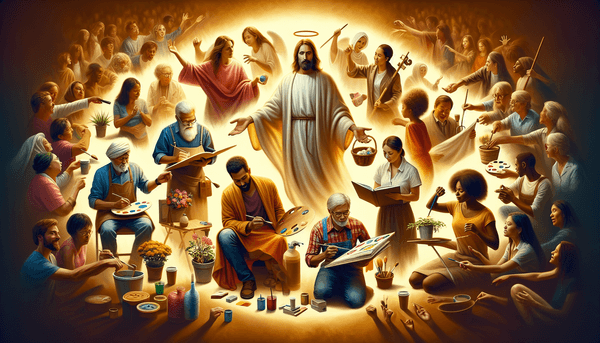The Song of Solomon: Celebrating Divine Love
The Song of Solomon stands as a unique book within the Old Testament, a lyrical masterpiece that celebrates the beauty of romantic love with poetic eloquence. It employs metaphors and vivid imagery to portray the love shared between a man and a woman, echoing the deeper love God intends for marital relationships. As the text says, 'My beloved spoke and said to me, Arise, my darling, my beautiful one, come with me' (Song of Solomon 2:10-13). The allegorical interpretations also suggest a representation of God's love for His people, a love that is strong as death, with jealousy unyielding as the grave (Song of Solomon 8:6-7). Such intimate language invites us to appreciate the divine gift of love and commitment within human relationships, reflecting a profound understanding of love that Proverbs 5:18-19 and Ephesians 5:25-27 also echo.
The Story of Ruth: Loyalty and Redemption
The narrative of Ruth is a heartwarming tale of loyalty, faithfulness, and divine providence. After the death of their husbands, Ruth's unwavering commitment to her mother-in-law Naomi is profound, as she chooses to leave her homeland and declares, 'Where you go I will go, and where you stay I will stay. Your people will be my people and your God my God' (Ruth 1:16-17). In the fields of Bethlehem, Ruth's dedication and hard work capture the attention of Boaz, who is moved by her story and extends kindness to her, fulfilling the role of a kinsman-redeemer. Their marriage not only provides for Naomi but also secures Ruth's place in the lineage of King David, and ultimately Jesus Christ, as noted in Matthew 1:5. Ruth's story exemplifies the blessings that arise from loyalty and kindness, virtues celebrated in Proverbs 17:17 and echoed throughout the scriptures.
Abraham: The Father of Faith
Abraham's life is a monumental journey of faith, marked by a series of divine tests that illustrate his profound trust in God. His call to leave his homeland and go to a place he would later receive as an inheritance was a leap of faith that defined his legacy (Hebrews 11:8-10). His ultimate test, the command to sacrifice his son Isaac, further demonstrates his willingness to trust in God's promises, a story that resonates with the faith counted to him as righteousness (Genesis 22:1-18; Romans 4:3). Abraham's life teaches us that active trust in God's word is crucial, even when it leads us into the unknown or requires substantial sacrifice. Like Abraham, who looked forward to a city with foundations, we too are called to maintain an eternal perspective, holding on to the hope that transcends our present circumstances (Hebrews 11:10).
Weathering Life's Storms: Lessons from Peter and Jesus
In the midst of life's tempests, the account of Peter walking on water towards Jesus offers a profound lesson in faith and focus. When Peter saw the wind, he was afraid and began to sink, crying out, 'Lord, save me!' Immediately, Jesus reached out his hand and caught him (Matthew 14:29-31). This moment teaches us that when we face trials, Jesus is present, ready to extend His hand the moment we call for help. Even as the waves of doubt seek to overwhelm us, the story of Peter encourages us to keep our eyes fixed on Christ, who calms the storm and whispers reassurance through the turmoil (Psalm 107:28-30). In our weakness, His strength is made perfect (2 Corinthians 12:9-10), empowering us to do all things through Him who gives us strength (Philippians 4:13).
Forgiveness and Healing: Overcoming Shame and Guilt
The journey towards forgiveness and healing often begins with the difficult task of confronting our own shame and guilt. The Bible assures us that if we confess our sins, God is faithful and just to forgive us, cleansing us from all unrighteousness (1 John 1:9). This process involves not only seeking forgiveness from God but also learning to forgive ourselves, embracing the truth that there is now no condemnation for those who are in Christ Jesus (Romans 8:1). As new creations in Christ, our past does not define us; we are set free to live a life unshackled by sin (2 Corinthians 5:17). The Psalmist reminds us that God removes our transgressions as far as the east is from the west (Psalm 103:12), calling us to bear one another's burdens and fulfill the law of Christ (Galatians 6:2).
The Bible's Guidance on Lust and Language
The Bible provides clear guidance on matters of the heart and our communication. It teaches us that lust is a form of adultery of the heart, urging us to guard our thoughts and pursue purity (Matthew 5:28; Proverbs 4:23). Similarly, the scripture emphasizes the importance of edifying language, encouraging words that build up rather than tear down (Ephesians 4:29). We are reminded to keep a tight rein on our tongues, understanding the power of our words to affect others and reflect our inner spiritual state (James 1:26). In all things, we are to put off our old self, which is characterized by practices such as impurity and coarse joking, and instead embrace a life that honors God (Colossians 3:8).
FAQ
Q: What does the Song of Songs talk about?
A: The Song of Songs, also known as the Song of Solomon, is a book in the Old Testament that celebrates the beauty of romantic love and intimacy between a bride and groom, using vivid imagery and metaphors to reflect the love God intends for marriage and human relationships.
Q: Tell me the story of Ruth.
A: The story of Ruth is about a Moabite woman who, after the death of her husband, shows extraordinary loyalty to her mother-in-law Naomi by returning with her to Bethlehem. There, Ruth meets Boaz, marries him, and becomes the great-grandmother of King David, making her an ancestor of Jesus Christ.
Q: What does it mean to hunger for righteousness?
A: To hunger for righteousness means to have a deep desire for justice, ethical living, and a right relationship with God, as affirmed by Jesus in the Beatitudes (Matthew 5:6). It is a longing for God's will to be done on earth and in one's life.
Q: How is Abraham a model of faith?
A: Abraham is considered the Father of Faith because he exemplified trust and obedience to God's commands, such as leaving his homeland for an unknown destination and being willing to sacrifice his son, Isaac. His life is a testament to living in alignment with God's will (Hebrews 11:8-10).






